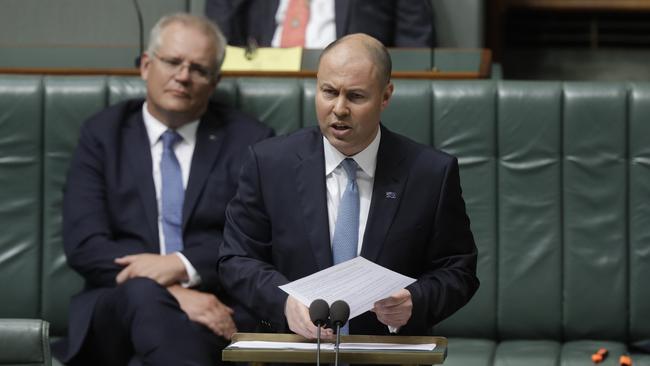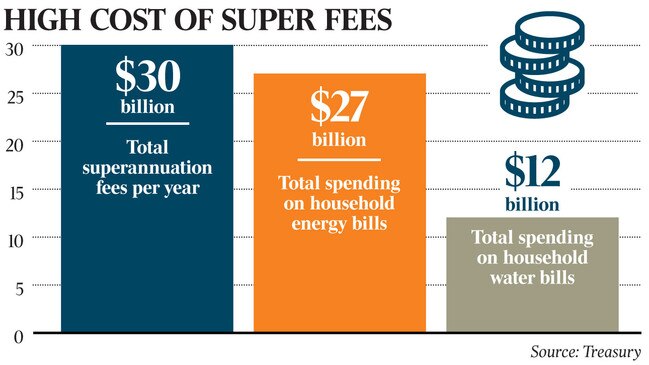How budget’s ‘Big Super’ changes will affect you
Union-linked industry funds have been hit with a wall of changes and if Frydenberg has his way, they will never be the same again.

But in fact it contained a major surprise: “Big Super”’ has been hit with a wall of changes and if Josh Frydenberg has his way, it will never be quite the same again.
At first glance the move looks like bad news for the union-linked industry funds that dominate the system, but it might not work out like that at all.
Rather, the new regime just might give us an arrangement more like the sharemarket where we can get the level of information we really need as the big funds get prodded towards a whole new level of transparency.
That’s the best-case scenario. The worst-case scenario is that a handful of funds are going to dominate: funds tilted towards younger workers will kick off with a huge advantage under new rules that begin on July 1 next year.
What’s more, a new test aimed at weeding out the worst performers might just result in a universal move towards the middle ground, where funds don’t want to risk failing the test but in doing so minimise the chances they will outperform.
These are huge changes — they will directly affect the vast majority of working Australians who have no choice but to hand over money each week to these funds through our compulsory superannuation system.
Our super system is widely admired overseas, but up close it has a range of flaws. Among its worst features are multiple super accounts and the easy way big funds can reel in unsuspecting younger workers who get defaulted into a fund by each successive employer. It means about 4.5 million people have two or more super accounts, which is a losing proposition where they pay two or more sets of fees.
The entire sector also operates with loose definitions about what constitutes a “balanced” fund or a “growth” fund — in reality, these terms are so flexible as to have little meaning.
So what are the changes and how will they affect you?
The essential change is that once you pick your first super fund it can stay with you for your entire career. If you don’t pick a fund, you still get defaulted into one — and if you default, it is likely to be an industry fund.
As a fund member you will be invited to an annual general meeting of the fund once a year and the management will be legally obliged to answer any questions around what they have been doing with your money.
To help you judge whether your fund is any good, there will be a new independent government-sourced website where you can compare the performance of all super funds and the fees they charge.

Moreover, funds will have to correspond with you once a year and tell you how they are faring against the wider industry.
That all sounds pretty good so far. But the reality is that the super system is nowhere near ready or willing to provide this level of information.
It’s what you might call a disclosure nightmare scenario for all funds — industry and retail.
If it works, we will finally see small and poorly managed funds disappear. Better still, we will get to see how big funds really work.
Questions the system can’t answer may be resolved such as: Would Hostplus be happy to get classified as a bigger risk-taker than many of its rivals? Would IOOF have been willing to explain how members were recently “compensated” with their own money? Would AustralianSuper like to explain how much flows to trade unions from its annual accounts?
In order to create a system where there is a fair chance questions of this nature can be answered, Treasury has effectively unleashed a much tougher regulation regime.
Here’s the key moves big funds must disclose:
● Remuneration of key executives, in line with ASX-listed companies, along with any related entity of the fund.
● Marketing expenditures relating to promoting the fund.
● Political donations.
● Sponsorships relating to promoting the fund.
● Payments to industry bodies or trade associations.
● Related-party transactions (including payments to non-investment entities).
Big funds must also pass a regulator test — if a fund fails for two years in a row, it cannot take on new members.
In tandem, the regulator — the Australian Prudential Regulation Authority — has stronger legal powers when challenging funds in the courtroom.
In the weeks ahead, the industry will huff and puff about these changes — poor performers will not want a comparable system (assuming a consumer-friendly comparison website site is even feasible), strong performers will not want to reveal their asset allocation settings, high-fee chargers will recoil from a system that aims to cut fees.
The biggest of the industry funds that also happen to have the youngest members may turn out to be early winners — for example Cbus due to building industry apprentices, and Hostplus and REST due to the young age of many hospitality workers. That’s because if a young worker in their first job does not actively choose a super fund, they will default into one of these funds — and once inside the fund the chances they will stay with that fund for their entire working lives are higher under the new system than the old system.
Unintended consequences perhaps?







By the time the budget finally was released on Tuesday the government had pre-released so much detail — especially on tax cuts and first-home incentives — it looked like there was nothing in there we didn’t already know.